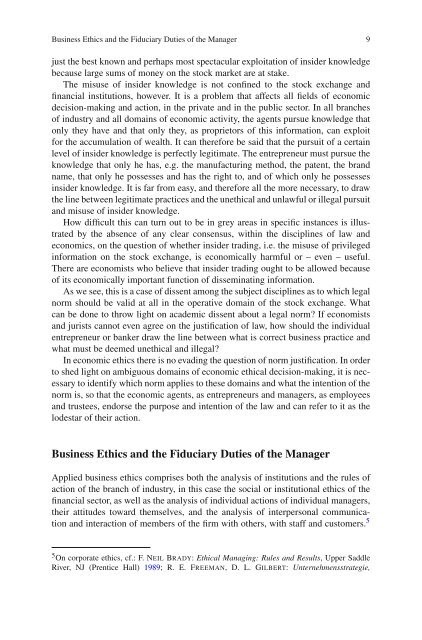The Ethics of Banking: Conclusions from the Financial Crisis (Issues ...
The Ethics of Banking: Conclusions from the Financial Crisis (Issues ...
The Ethics of Banking: Conclusions from the Financial Crisis (Issues ...
You also want an ePaper? Increase the reach of your titles
YUMPU automatically turns print PDFs into web optimized ePapers that Google loves.
Business <strong>Ethics</strong> and <strong>the</strong> Fiduciary Duties <strong>of</strong> <strong>the</strong> Manager 9<br />
just <strong>the</strong> best known and perhaps most spectacular exploitation <strong>of</strong> insider knowledge<br />
because large sums <strong>of</strong> money on <strong>the</strong> stock market are at stake.<br />
<strong>The</strong> misuse <strong>of</strong> insider knowledge is not confined to <strong>the</strong> stock exchange and<br />
financial institutions, however. It is a problem that affects all fields <strong>of</strong> economic<br />
decision-making and action, in <strong>the</strong> private and in <strong>the</strong> public sector. In all branches<br />
<strong>of</strong> industry and all domains <strong>of</strong> economic activity, <strong>the</strong> agents pursue knowledge that<br />
only <strong>the</strong>y have and that only <strong>the</strong>y, as proprietors <strong>of</strong> this information, can exploit<br />
for <strong>the</strong> accumulation <strong>of</strong> wealth. It can <strong>the</strong>refore be said that <strong>the</strong> pursuit <strong>of</strong> a certain<br />
level <strong>of</strong> insider knowledge is perfectly legitimate. <strong>The</strong> entrepreneur must pursue <strong>the</strong><br />
knowledge that only he has, e.g. <strong>the</strong> manufacturing method, <strong>the</strong> patent, <strong>the</strong> brand<br />
name, that only he possesses and has <strong>the</strong> right to, and <strong>of</strong> which only he possesses<br />
insider knowledge. It is far <strong>from</strong> easy, and <strong>the</strong>refore all <strong>the</strong> more necessary, to draw<br />
<strong>the</strong> line between legitimate practices and <strong>the</strong> unethical and unlawful or illegal pursuit<br />
and misuse <strong>of</strong> insider knowledge.<br />
How difficult this can turn out to be in grey areas in specific instances is illustrated<br />
by <strong>the</strong> absence <strong>of</strong> any clear consensus, within <strong>the</strong> disciplines <strong>of</strong> law and<br />
economics, on <strong>the</strong> question <strong>of</strong> whe<strong>the</strong>r insider trading, i.e. <strong>the</strong> misuse <strong>of</strong> privileged<br />
information on <strong>the</strong> stock exchange, is economically harmful or – even – useful.<br />
<strong>The</strong>re are economists who believe that insider trading ought to be allowed because<br />
<strong>of</strong> its economically important function <strong>of</strong> disseminating information.<br />
As we see, this is a case <strong>of</strong> dissent among <strong>the</strong> subject disciplines as to which legal<br />
norm should be valid at all in <strong>the</strong> operative domain <strong>of</strong> <strong>the</strong> stock exchange. What<br />
can be done to throw light on academic dissent about a legal norm? If economists<br />
and jurists cannot even agree on <strong>the</strong> justification <strong>of</strong> law, how should <strong>the</strong> individual<br />
entrepreneur or banker draw <strong>the</strong> line between what is correct business practice and<br />
what must be deemed unethical and illegal?<br />
In economic ethics <strong>the</strong>re is no evading <strong>the</strong> question <strong>of</strong> norm justification. In order<br />
to shed light on ambiguous domains <strong>of</strong> economic ethical decision-making, it is necessary<br />
to identify which norm applies to <strong>the</strong>se domains and what <strong>the</strong> intention <strong>of</strong> <strong>the</strong><br />
norm is, so that <strong>the</strong> economic agents, as entrepreneurs and managers, as employees<br />
and trustees, endorse <strong>the</strong> purpose and intention <strong>of</strong> <strong>the</strong> law and can refer to it as <strong>the</strong><br />
lodestar <strong>of</strong> <strong>the</strong>ir action.<br />
Business <strong>Ethics</strong> and <strong>the</strong> Fiduciary Duties <strong>of</strong> <strong>the</strong> Manager<br />
Applied business ethics comprises both <strong>the</strong> analysis <strong>of</strong> institutions and <strong>the</strong> rules <strong>of</strong><br />
action <strong>of</strong> <strong>the</strong> branch <strong>of</strong> industry, in this case <strong>the</strong> social or institutional ethics <strong>of</strong> <strong>the</strong><br />
financial sector, as well as <strong>the</strong> analysis <strong>of</strong> individual actions <strong>of</strong> individual managers,<br />
<strong>the</strong>ir attitudes toward <strong>the</strong>mselves, and <strong>the</strong> analysis <strong>of</strong> interpersonal communication<br />
and interaction <strong>of</strong> members <strong>of</strong> <strong>the</strong> firm with o<strong>the</strong>rs, with staff and customers. 5<br />
5 On corporate ethics, cf.: F. NEIL BRADY: Ethical Managing: Rules and Results, Upper Saddle<br />
River, NJ (Prentice Hall) 1989; R. E. FREEMAN, D. L. GILBERT: Unternehmensstrategie,

















